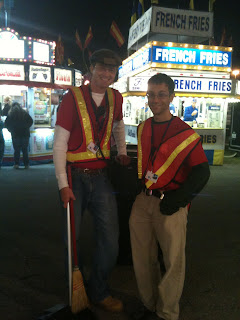The fair was absolutely crazy. It called for 3 workers a night, myself being one of them, and over the course of 10 days IES ran through 11 different workers. We were plagued with issues my guys promise “will never happen again.” Some came one day and not the next, others late and a few more not at all. One had to take care of his sick ‘old lady,’ another had to babysit his 16 and 12 year old sister and brother, and later had a church revival he promised his pastor he would attend. One fussed at me for being a minute late to pick him up, and then, once at the fair, sat on the toilet for over half an hour. One never became a worker because he got arrested on his way, and another was arrested today—payday—for first degree burglary, and his girlfriend lied to me, picking up his check without permission.
These are only my thoughts, but I think it will be healthy if I can grieve seemingly bad decisions without becoming attached to them. Otherwise, I’ll get discouraged and quit. Or, my arrogance won’t stand it, because nobody should bypass something this good for them. But the truth is I don’t know whether this is good for them or not. It may be for some and not others, or maybe not anyone. People are complicated, and I learned while living at the Star Gospel to at least try not to be presumptuous about someone else’s needs. Because when I was, I got them all wrong.
Christ knew what people needed, but it’s possible the very legs that once were lame later helped them steal a diamond necklace and run. It seems that Christ loved without condition. He could have healed only those who wouldn’t fudge his blessings, but I don’t think that’s what he did, at least not with me. I try to invest without having to control, try to give without conditions, but it seems impossible and sometimes stupid. I don't know the answers.
Other things, though, have genuinely gone well. There’s been excitement amongst the guys. The idea of the Hope Fund has been successful. One worked 55 hours and earned—in addition to the wage he would have received from a for profit agency—another $55 applied to his water bill. Another worked 45 hours and earned the same amount towards his electric bill. We didn’t get fired, and I handed out at least a few business cards. I’m taking some time to try to reflect on what went well and what didn’t, and to raise some money for what I believe are the bare essentials to give us a chance for success. Hopefully there will be more on that to come.




